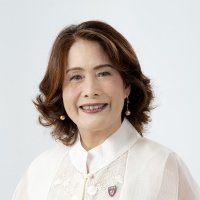Bridging Medicine and Climate Advocacy: A Physician’s Leadership Journey

"I came into the program looking for strategies to enhance my leadership—what I found was a new way of thinking about change."
As an internist and lung specialist in the Philippines, Paula Teresa F. Sta Maria, MD, has dedicated her career to patient care and advancing public health. After transitioning into a leadership role, she encountered a challenge she hadn’t fully anticipated—how to mobilize and inspire more than 14,000 internists to take meaningful action on climate and health.
Faced with the need to enhance her leadership skills quickly, Sta Maria looked for an educational program that offered both depth and efficiency. She found her answer in Harvard Medical School’s Leadership in Medicine: Asia Pacific program. The program’s one-year structure, focus on leadership, and diverse cohort of professionals from around the Asia Pacific region stood out as the perfect fit.
Recognizing the Need for Growth
When Sta Maria became chair of the Philippine College of Physicians’ Committee on Climate Change, Environment, and Health, she had to build everything from the ground up—establishing the committee’s vision, mission, and strategic direction. “I thought that with passion, commitment, and prior leadership experience, I could ace it,” Sta Maria recalls. “At first, things went well, but by the second and third years, I realized that I needed more structure, mentorship, and a stronger strategy to engage stakeholders beyond our immediate circle.”
She found herself asking, Who leads the leader? Sta Maria explored options within the Philippines but wanted diverse perspectives. She found exactly that in the Leadership in Medicine certificate program, joining a cohort of 72 health care leaders from 14 countries.
Her peers included clinicians, health care executives, government officials, and industry innovators, each bringing unique insights to the table. “It wasn’t just didactic learning; it was collaborative,” she says. “We debated, exchanged ideas, and explored different approaches to leadership and problem-solving. The experience was invaluable.”
A Transformative Learning Experience
Leadership in Medicine gave Sta Maria the tools to turn vision into action. One of the most critical takeaways was the ability to apply structured leadership frameworks to real-world challenges. “I came into the program looking for strategies to enhance my leadership—what I found was a new way of thinking about change,” she shares.
The key turning points for Sta Maria were the sessions on strategic leadership, which emphasized the importance of building coalitions and aligning stakeholders. “I realized that leading change isn’t about persuading people to follow—it’s about creating an environment where they want to take ownership,” she explains. This shift in mindset shaped how she engaged her peers, moving from directive leadership to collaborative problem-solving.
She applied this approach to her sustainability efforts, including an initiative to reduce single-use plastics in hospitals. Instead of issuing a mandate, Sta Maria and her team launched a behavioral change campaign—the “Seven Days of Love for Mother Earth” challenge—encouraging small, incremental actions. The result was a lasting cultural shift in hospital sustainability practices, demonstrating the power of leadership beyond policy.
Integrating Climate Advocacy and Medical Training
Beyond building critical skills, Sta Maria credits Leadership in Medicine with strengthening her confidence and strategic mindset. “Before, I looked at everything from a macro perspective. Now, I’ve learned to zoom in on the micro-level changes that build toward systemic impact.”
Sta Maria’s work has already begun to influence the broader medical community. She founded “I.M. Doctor of Earth.,” an initiative providing factual resources on climate change and health, with the goal of integrating environmental education into medical training. “We’re now working to make climate change education a requirement for medical residents,” she shares. “It’s no longer an elective—it’s a must.”
Her efforts have gained international recognition as well. She has authored an article on the role of physicians in climate advocacy, been invited to speak at conferences, and is set to present at an international congress in Dubai on the intersection of public health, planetary health, and climate activism.
Reflecting on her Leadership in Medicine experience, Sta Maria encourages others to take the leap. “This program gave me the structure, mentorship, and global network I needed to lead more effectively. If you’re looking to create real change, start small, build momentum, and surround yourself with the right people. Harvard Medical School helped me do that.”
Written by: Pamela Searle
